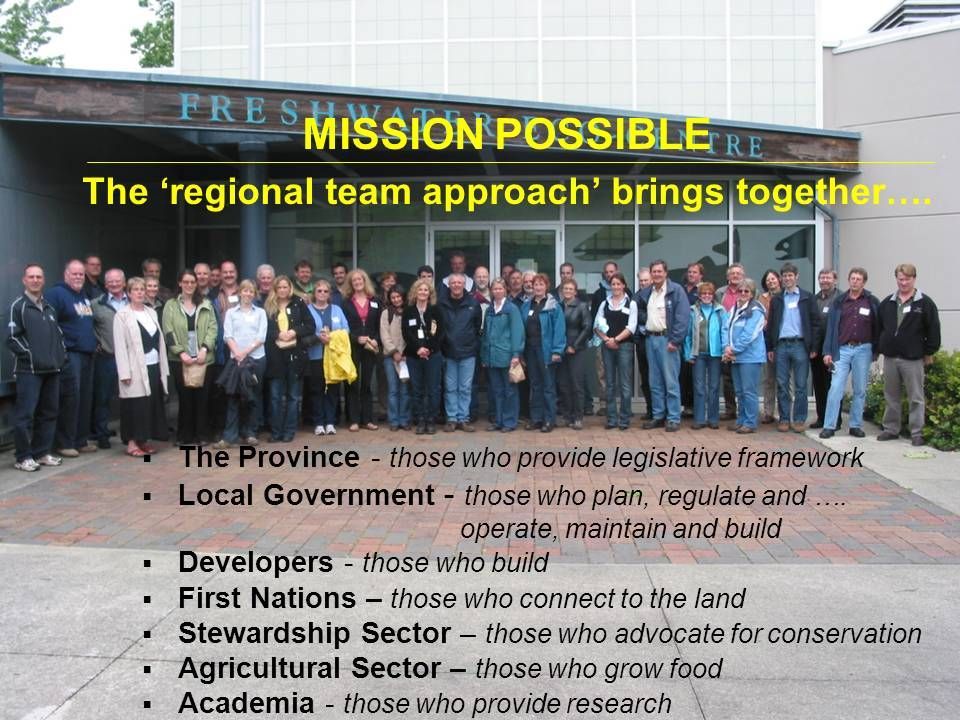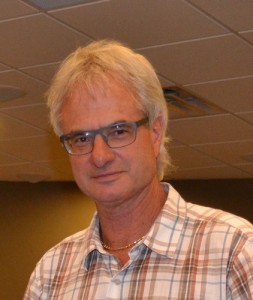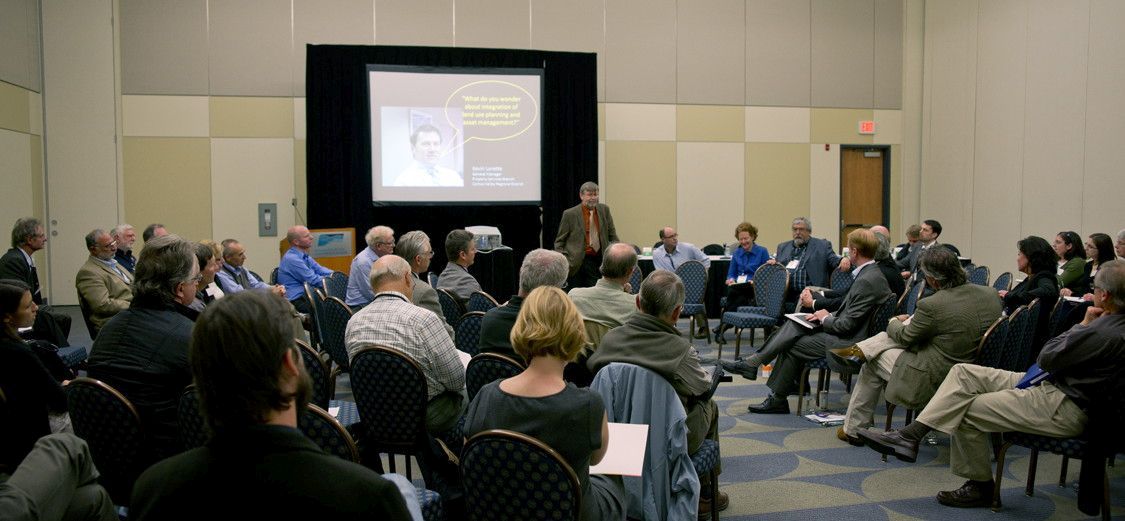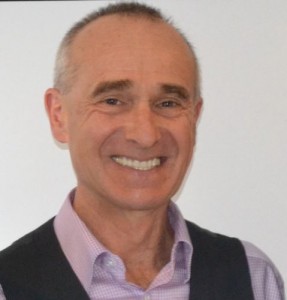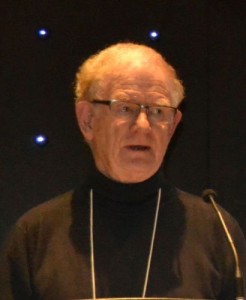The Journey to Balance Economy, Ecology and Settlement on Vancouver Island
Note to Reader:
 Sitelines magazine is a publication of the British Columbia Society of Landscape Architects (BCSLA). Published bi-monthly, BCSLA has a longstanding practice of inviting partner organizations to take on a co-editor role and provide the content for an issue featuring the partner.
Sitelines magazine is a publication of the British Columbia Society of Landscape Architects (BCSLA). Published bi-monthly, BCSLA has a longstanding practice of inviting partner organizations to take on a co-editor role and provide the content for an issue featuring the partner.
The June 2016 issue featured the Partnership for Water Sustainability in BC. This allowed the Partnership to showcase initiatives and tools. Reproduced below is the article co-authored by John Finnie, Derek Richmond and Eric Bonham
Mission Possible
“In 2005, the Water Sustainability Action Plan for BC initiated and cross-pollinated “convening for action” programs in three regions: Vancouver Island, Metro Vancouver and the Okanagan. Each had its own vision and road map. A commonality, however, was a desire for a Regional Team Approach founded on partnerships and collaboration,” wrote John Finnie, Derek Richmond and Eric Bonham. In the article, they integrated three perspectives – PAST, PRESENT and FUTURE – to provide a seamless history of their shared journey.
“Insertion of the word team in ‘regional approach’ has had a profound impact on how practitioners view their world. Team implies there is a personal commitment; it also suggests there is a game plan and coachable context. The Regional Team Approach is proving to be a powerful motivator.”
John Finnie, Derek Richmond and Eric Bonham are members of the Partnership’s Leadership Team. Prior to retiring from government, all three held senior positions: John Finnie was General Manager of Regional and Community Utilties, Regional District of Nanaimo; Derek Richmond was the Manager of Engineering, City of Courtenay; and Eric Bonham was a Director in two provincial ministries (Municipal Affairs and Environment).
To Learn More:
Download In this issue, the Partnership for Water Sustainability in BC presents WATER BALANCE PATHWAY TO A WATER-RESILIENT FUTURE, June 2016, to read the complete set of 9 articles published in Sitelines Magazine.
CAVI – in the beginning……
“It started with a conversation. In 2005 a group of similar thinking individuals, recognizing a need to balance economy and ecology with the increasing settlement on Vancouver Island, and the critical importance of water in that equation, gathered in Parksville to have a conversation about water sustainability on Vancouver Island.”
“Within a year, that initial meeting evolved into a movement, Convening for Action on Vancouver Island – Leadership for Water Sustainability. CAVI. Formally launched in 2006 at the Water in the City Conference in Victoria, CAVI was initially co-funded by the Ministry of Environment, Ministry of Community Development and the Real Estate Foundation of BC as a demonstration program, with support from local governments on Vancouver Island.”
“Convening for Action on Vancouver Island set a goal that Vancouver Island would be well on its way to water sustainability by 2010. Since that initial meeting in 2005, CAVI has successfully promoted the message of water sustainability by engaging governments, developers and the community in water-centric thinking, planning and development activities.”
Cathedral Thinking?
“There is much yet to be done but CAVI’s approach is like Cathedral Thinking – an idea that takes time to evolve and establish, and ends up benefitting future generations. It is not so much what we do but what we cause to happen that matters.”
“The original CAVI team exceeded their program expectations. Water sustainability became a common thread in discussions and decisions about land development, water use and water conservation. Participants from governments, the development community, academia, consulting organizations, and others, understand the importance of water sustainability and incorporate water sustainability practices into their activities.”
“Water-centric thinking, planning and doing have become more than a vision. They are a reality on Vancouver Island and elsewhere in BC. CAVI was a driver in this accomplishment and demonstrated what can be done through partnerships and collaboration. CAVI continues to organize events that create opportunities to start conversations that lead to action. The signature Learning Lunch seminars created a multi-agency network that builds and educates on successful practices. CAVI works because there is no pressure, no regulation, no “must do’s”. It is about people sharing ideas and successes with people.”
Four Cs for Lunch
“While information exchange through the Learning Lunch series was the genesis for CAVI’s evolution, its credibility has grown through the inter-regional implementation of the 4-C’s – collaboration, communication, cooperation and coordination. This approach culminated in the Georgia Basin Inter-Regional Educational Initiative (IREI), whose focus is on a watershed-based approach to community planning and development. The Capital, Cowichan Valley, Nanaimo and Comox Valley Regional Districts have endorsed the IREI and support IREI activities.”
“Experience and intuition tell us that collaborating and planning on a watershed basis is the right thing to do. Innovative servicing standards provide more on-site rainwater capture, more infiltration into the ground and facilitate the slow release of run-off response to rainfall events. Many of these innovative standards had not, until recently, been tested over the longer term for their continuing effectiveness, public acceptance, and maintenance costs.”
“There was reluctance by municipalities for major changes to their servicing standards without a proven track record. This institutional inertia to change could only be overcome with a better understanding and demonstrated success of new approaches. CAVI can now demonstrate this through networking and outreach, education and training, capacity building and development of products and tools.”
The Asset Management Challenge
“Asset management usually commences after something is built. The challenge is to think about what asset management entails BEFORE the asset is built. Cost-avoidance is a driver for this ‘new business as usual’. This paradigm-shift starts with land use and watershed-based planning, to determine what services are affordable, both now and over time.”
“Developers, governments and agencies understand that a collaborative balance of economy, settlement and ecology provides for the best outcomes. Through ‘developer dialogue’, the approach of planning for development on a watershed basis and getting things right at the front end has emerged as essential for investing in the right infrastructure for pragmatic asset management.”
“By viewing watersheds through an asset management lens, Sustainable Service Delivery integrates all the principles of Asset Management. It understands the value of both land-use planning and its impacts on service delivery. It also integrates the ‘design with nature’ philosophy, the genesis for balancing economy, ecology and settlement.”
So now what?
“As we stand at the start of a new chapter in adapting to climate change on the west coast, we are faced with a challenge and an opportunity to get things right at the front end. We can succeed with collaborative planning and building on a proven cooperative model that is working through the solid foundation built by CAVI. Our challenge is to get the right cornerstone firmly set in the right place for the next levels of the initiative. Because affordability ultimately drives local government asset management and infrastructure standards of practice, sustainable service delivery is one of the foundation pieces for building the next phase of a vision for Vancouver Island……..”
Such as “The VI2065 Vision””
“The future of Vancouver Island calls for Cathedral-like thinking to create a vision that is inspirational, pragmatic, and based on a strong foundation. Individuals, communities and local governments must commit to a future that ensures both water security and the sustainability of our watersheds. The VI2065 initiative will create a legacy to support settlement change on Vancouver Island in balance with ecology and economy.”
“Given this context and the reality of climate change, planners, engineers, politicians and citizens will be collectively challenged to focus on water-resilient outcomes against a backdrop of an unpredictable water cycle. Achieving consensus in this situation emphasizes a commitment to collaboration based upon cooperation and partnerships across institutional and political boundaries.”
“On Vancouver Island, as elsewhere, water security underpins economic security, for water is truly the connector of all activities – the economy, ecology, urban settlement, agriculture and the wellbeing of humans and other living things. CAVI has collaborated on VI2065 with several agencies including provincial and local governments, Vancouver Island Economic Alliance (VIEA), Royal Roads University (RRU) and Vancouver Island University (VIU). Engaging the academic sector and youth is considered an important component of the VI2065 vision as future leaders are trained to address the challenges of a rapidly changing world where the economy, ecology and human settlement in balance will become central to maintaining a stable society.”
“VI2065 envisions a Vancouver Island based on long-term sustainability and water resiliency models that involve innovative partnerships. The results guide us towards effective land and water management practices. Water is an entrance point for the discussion on climate change, for the connection on this complex issue is clearly understood in light of the increase in floods and droughts.”
CAVI – moving forward…..
“In 2015, the scope of CAVI as a regional initiative of the Partnership for Water Sustainability in BC was redefined. With past successes and some fresh ideas, CAVI is moving forward under a new name – The Partnership on Vancouver Island. The conversations that lead to education and accomplishment continue,” concluded the three co-authors.


